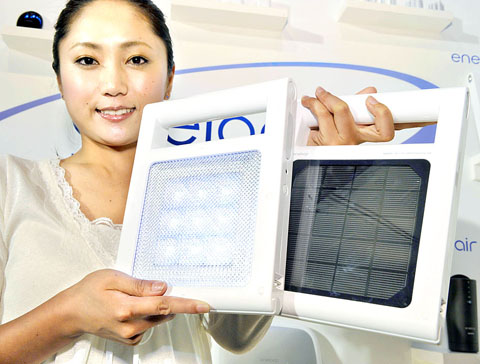The world must speed up the deployment of solar power as it has the potential to meet all the world’s energy needs, the chairman of an industry gathering that wrapped up on Friday in Spain said.
“The solar energy resource is enormous, and distributed all over the world, in all countries and also oceans,” said Daniel Lincot, the chairman of the five-day European Photovoltaic Solar Energy conference held in Valencia.
“There is thus an enormous resource available from photovoltaics, which can be used everywhere, and can in principle cover all the world energy demand from a renewable, safe and clean source,” Lincot said.

PHOTO: AFP
Lincot, the research director of the Paris-based Institute for Research and Development of Photovoltaic Energy, said solar energy was growing rapidly but still made only a “negligible” contribution to total energy supply.
Last year the world production of photovoltaic models represented a surface of 40km², while meeting the electrical consumption of countries like France or Germany would require 5,000km², he said.
Under current scenarios, photovoltaic models will represent about 1,000km² by 2020, accounting for only about 3 percent of energy needs in the 27-member EU, he said.
More than 200 scientists and solar power experts have signed a declaration calling for the accelerated deployment of photovoltaic power that was launched at the conference.
More than 3,500 experts and 715 sector firms took part in the gathering, billed as the largest conference ever organized in the field of photovoltaic conversion of solar energy.
Germany and Spain are the world leaders in solar energy power.
Germany has 4,000 megawatts of installed capacity, while Spain has 600 megawatts.

Taiwanese suppliers to Taiwan Semiconductor Manufacturing Co. (TSMC, 台積電) are expected to follow the contract chipmaker’s step to invest in the US, but their relocation may be seven to eight years away, Minister of Economic Affairs J.W. Kuo (郭智輝) said yesterday. When asked by opposition Chinese Nationalist Party (KMT) Legislator Niu Hsu-ting (牛煦庭) in the legislature about growing concerns that TSMC’s huge investments in the US will prompt its suppliers to follow suit, Kuo said based on the chipmaker’s current limited production volume, it is unlikely to lead its supply chain to go there for now. “Unless TSMC completes its planned six

Intel Corp has named Tasha Chuang (莊蓓瑜) to lead Intel Taiwan in a bid to reinforce relations between the company and its Taiwanese partners. The appointment of Chuang as general manager for Intel Taiwan takes effect on Thursday, the firm said in a statement yesterday. Chuang is to lead her team in Taiwan to pursue product development and sales growth in an effort to reinforce the company’s ties with its partners and clients, Intel said. Chuang was previously in charge of managing Intel’s ties with leading Taiwanese PC brand Asustek Computer Inc (華碩), which included helping Asustek strengthen its global businesses, the company

Power supply and electronic components maker Delta Electronics Inc (台達電) yesterday said second-quarter revenue is expected to surpass the first quarter, which rose 30 percent year-on-year to NT$118.92 billion (US$3.71 billion). Revenue this quarter is likely to grow, as US clients have front-loaded orders ahead of US President Donald Trump’s planned tariffs on Taiwanese goods, Delta chairman Ping Cheng (鄭平) said at an earnings conference in Taipei, referring to the 90-day pause in tariff implementation Trump announced on April 9. While situations in the third and fourth quarters remain unclear, “We will not halt our long-term deployments and do not plan to

TikTok abounds with viral videos accusing prestigious brands of secretly manufacturing luxury goods in China so they can be sold at cut prices. However, while these “revelations” are spurious, behind them lurks a well-oiled machine for selling counterfeit goods that is making the most of the confusion surrounding trade tariffs. Chinese content creators who portray themselves as workers or subcontractors in the luxury goods business claim that Beijing has lifted confidentiality clauses on local subcontractors as a way to respond to the huge hike in customs duties imposed on China by US President Donald Trump. They say this Chinese decision, of which Agence